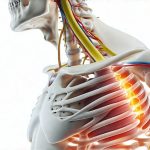Migraines and headaches are incredibly common conditions, affecting millions worldwide. Often dismissed as simply ‘bad headaches’, these neurological events can be debilitating, significantly impacting quality of life. But what if the source of your head pain isn’t necessarily in your head, but originates lower down, in the digestive system? Increasingly, research is pointing to a surprising connection between gastroesophageal reflux disease (GERD) and both migraine and chronic headache sufferers. The link isn’t always obvious, which is why many people don’t associate these two conditions, making diagnosis and effective treatment more challenging.
This emerging understanding challenges the traditional view of migraines and headaches as solely neurological events. It suggests a complex interplay between the gut, the brain, and the vagus nerve – often referred to as the ‘gut-brain axis’. GERD involves stomach acid flowing back up into the esophagus, causing irritation and inflammation. This seemingly localized digestive issue can trigger a cascade of physiological responses that ultimately contribute to head pain in susceptible individuals. Understanding this potential connection is crucial for anyone experiencing frequent or severe headaches, as it opens doors to alternative treatment strategies beyond traditional migraine medication.
The Gut-Brain Axis & Reflux: A Potential Pathway
The relationship between GERD and migraines isn’t a simple cause-and-effect scenario; it’s a complex interplay mediated by the gut-brain axis. This bidirectional communication system involves direct physical connections (like the vagus nerve) and indirect pathways involving the immune system, hormones, and neurotransmitters. When stomach acid repeatedly irritates the esophagus, it doesn’t just cause heartburn – it sets off an inflammatory response within the body. This inflammation can affect multiple systems, including the nervous system.
- The vagus nerve plays a crucial role here. It’s a long cranial nerve that runs from the brainstem to the abdomen, acting as a major highway for communication between the gut and the brain. GERD-related esophageal irritation stimulates vagal afferent nerves, sending signals to the brain which can ultimately trigger migraine or headache onset in predisposed individuals.
- Changes in gut microbiota – the trillions of bacteria living in our digestive system – are also believed to play a part. GERD medications (like proton pump inhibitors) can disrupt the gut microbiome, potentially exacerbating inflammation and increasing susceptibility to headaches. If you suspect your diet is impacting your gut health, consider exploring can food intolerances trigger migraines.
This isn’t just theoretical. Studies have shown that individuals with migraines are more likely to have functional gastrointestinal disorders like GERD compared to those without migraines. Furthermore, some migraine sufferers report a direct correlation between episodes of heartburn or acid reflux and the onset of their headaches. It’s important to note this doesn’t mean everyone with GERD will develop migraines; it highlights a potential link in certain individuals. Understanding your triggers can be difficult, so consider if can you be addicted to trigger foods is playing a role.
Identifying the Connection: Symptoms & Diagnosis
Recognizing the possibility of a GERD-migraine connection requires paying attention to your symptoms and considering patterns that might suggest a link. Typical GERD symptoms include heartburn, regurgitation (acid coming back up into the throat), difficulty swallowing, and a chronic cough. However, atypical symptoms can be more subtle and easily overlooked – these are where the connection to headaches often lies. These may include:
- Chronic sore throat
- Hoarseness
- Frequent clearing of the throat
- A feeling of a lump in the throat (globus sensation)
- Chest pain that isn’t cardiac related
If you experience frequent headaches alongside any of these GERD symptoms, it’s worth exploring further. Diagnosis requires a multi-faceted approach. Your doctor may recommend:
- Gastrointestinal Evaluation: This might involve an endoscopy to examine the esophagus for damage caused by acid reflux and testing for Helicobacter pylori infection (a common cause of GERD).
- Headache Assessment: A detailed headache history, including frequency, severity, location, triggering factors, and associated symptoms, is crucial. Neurological examination may also be performed to rule out other causes.
- Trial of GERD Treatment: In some cases, your doctor might recommend a trial period of acid-suppressing medication (under medical supervision) to see if headache frequency or severity decreases. This doesn’t confirm the diagnosis but provides valuable information.
It’s crucial to consult with both a gastroenterologist and a neurologist for accurate diagnosis and personalized treatment plans. Self-treating GERD without addressing potential underlying causes can mask symptoms and delay proper evaluation of your headaches. For some, can emotions trigger physical gut reactions may be a contributing factor to both conditions.
Lifestyle Modifications for Management
If a connection between GERD and your headaches is suspected or confirmed, lifestyle modifications are often the first line of defense. These changes aim to reduce acid reflux and minimize irritation of the esophagus, potentially lessening headache triggers.
- Dietary Changes:
- Avoid trigger foods: Common culprits include fatty foods, spicy foods, chocolate, caffeine, alcohol, carbonated beverages, and citrus fruits.
- Eat smaller, more frequent meals rather than large ones.
- Don’t lie down immediately after eating – wait at least 2-3 hours.
- Positional Adjustments: Elevating the head of your bed by 6-8 inches can help prevent acid reflux during sleep. This is often achieved with bed risers or a wedge pillow. Avoid sleeping flat.
- Weight Management: Obesity increases intra-abdominal pressure, contributing to GERD. Losing even a small amount of weight can significantly reduce symptoms.
These lifestyle changes are not a quick fix but represent sustainable strategies for managing both GERD and potentially mitigating headache triggers. Consistency is key; incorporating these modifications into your daily routine will yield the best results. Be mindful that can frequent snacking trigger gut problems which can exacerbate symptoms.
Medication & Treatment Options
While lifestyle changes form the foundation of management, medications may be necessary to control GERD symptoms and reduce their impact on headaches. These typically fall into several categories:
- Antacids: Provide temporary relief by neutralizing stomach acid but don’t address the underlying cause.
- H2 Blockers: Reduce acid production in the stomach, offering longer-lasting relief than antacids.
- Proton Pump Inhibitors (PPIs): The most potent acid-suppressing medications, often prescribed for more severe GERD. However, long-term PPI use can have potential side effects and may disrupt gut microbiota, so they should be used under strict medical supervision.
- Prokinetics: Help speed up the emptying of the stomach, reducing the amount of time acid has to reflux into the esophagus.
It’s vital to understand that medication is often part of a broader treatment plan. Addressing underlying causes of GERD – such as H. pylori infection or hiatal hernia – may also be necessary. Furthermore, if headaches persist despite controlling GERD symptoms, exploring other headache treatments with a neurologist is crucial. Can poor sleep trigger food reactions which can worsen both conditions?
The Role of the Microbiome & Future Research
The gut microbiome’s role in this connection is gaining increasing attention. As mentioned earlier, GERD medications like PPIs can alter the composition of the gut microbiota, potentially exacerbating inflammation and contributing to headaches. Restoring a healthy gut microbiome may therefore offer therapeutic benefits.
- Probiotics: Supplementing with probiotics (live beneficial bacteria) could help rebalance the gut flora disrupted by medication or GERD itself.
- Prebiotics: Consuming prebiotic-rich foods (like onions, garlic, and bananas) provides nourishment for beneficial bacteria in the gut.
- Dietary Fiber: A diet rich in fiber promotes a healthy gut microbiome and overall digestive health.
Research into the GERD-migraine connection is still evolving. Scientists are investigating how specific inflammatory markers associated with GERD affect brain function and headache development. They’re also exploring personalized treatment approaches based on individual gut microbiome profiles. The future of managing this complex interplay likely lies in a holistic approach that addresses both digestive health and neurological well-being. Ultimately, recognizing the potential link between GERD and headaches can empower patients to seek more comprehensive care and potentially find relief from chronic pain. Consider whether can music or light affect gut symptoms contribute to your experience as well.


















